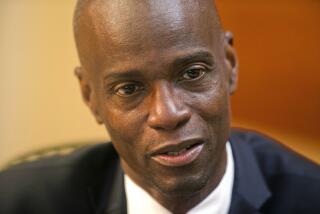U.S. Indicts Cuban Airmen in 1996 Deaths
- Share via
MIAMI — Ten days after some Florida Republicans demanded that President Bush get tougher on Cuba, federal prosecutors on Thursday announced the murder indictments of a Cuban general and two fighter pilots in the downing of two unarmed Cessnas over waters between Cuba and Florida in 1996.
Simultaneously, TV Marti, the U.S. government-funded station that broadcasts daily to the Communist-ruled island, said in a news release that it would soon begin testing video transmissions by satellite, with a signal reaching all of Cuba.
The developments were greeted with delight by Cuban American enemies of Fidel Castro, who had accused the Bush White House of not living up to what it promised them and hinted at political reprisals.
“The administration has finally started down the road toward meeting its commitments,” said Joe Garcia, executive director of the Cuban American National Foundation, a major lobbying group.
The three Cuban military men were charged with four counts of murder, one count of conspiracy to kill U.S. citizens and two counts of destruction of aircraft. If convicted, they could face life in prison or the death penalty, but the men are believed to be in Cuba, and extradition appears highly unlikely.
On Aug. 11, in an open letter to the president, 13 Republican members of the Florida House of Representatives, mostly Cuban Americans from the Miami area, warned that if the administration didn’t quickly alter its course on Cuba, Bush might lose support among Cuban Americans, a key GOP constituency, in the 2004 election.
Two of the state lawmakers’ demands were that Bush deliver the increased support to TV Marti that they said he had promised, and that Cuban officials responsible for the Feb. 24, 1996, downing over the Florida Strait -- including Castro, president and commander in chief of Cuba’s military -- be brought to justice.
At the time, a trio of Cessna 337 Skymasters from the exile group Brothers to the Rescue were combing the waters off Cuba’s northern coast, searching for rafters trying to reach the United States in homebuilt boats. According to U.S. officials, Cuban authorities scrambled two fighters, a MIG-23 and MIG-29, and the MIG-29 attacked two of the Cessnas, killing their four passengers, three of whom were American citizens. The third plane, carrying Brothers to the Rescue leader Jose Basulto, escaped unscathed.
Killed were U.S. citizens Carlos Costa, Mario de la Pena and Armando Alejandre, and permanent U.S. resident Pablo Morales.
On Thursday, the U.S. attorney’s office in Miami announced the federal indictments of Gen. Ruben Martinez Puente, identified as the head of the Cuban air force at the time, and Lorenzo Alberto Perez-Perez and Francisco Perez-Perez, identified as crew members of the MIG-29.
In a statement, Marcos Daniel Jimenez, U.S. attorney for southern Florida, said “the improper and unlawful shoot down was one part of a conspiracy undertaken on American soil through the activities of a Cuban espionage ring that infiltrated the United States.”
The spy ring, Jimenez said, fed the FBI false information, guaranteeing that the exiles’ flights could take off on the day the Cessnas were shot down.
The Cuban Interests Section in Washington, the nation’s equivalent of an embassy, could not be reached for comment.
“The relevance of these indictments probably will only come when Fidel Castro falls from power,” said state Rep. Marco Rubio, majority leader in the Florida House and a signatory of the letter to Bush. “If the indicted men now come to the U.S., they’ll be arrested. If they go to any country with which the U.S. has an extradition treaty, they’ll be arrested.”
A few days after the planes were shot down, then-U.N. Ambassador Madeleine Albright released a transcript of radio conversations between Cuban ground control and the MIG crew that she said demonstrated “the joy of these pilots in committing cold-blooded murder.”
After downing one Cessna with a missile, one pilot reportedly remarked: “This one won’t mess around anymore.”
The U.S. government said the downed aircraft had not penetrated Cuban airspace but acknowledged that the Cessna carrying Basulto had. Cuban government representatives said Brothers to the Rescue had plans to dynamite power lines in Havana, sabotage an oil refinery and attack Cuban leaders -- a charge rejected by Albright.
Within days of the incident, Lorenzo Alberto Perez-Perez went on the island’s state-run television to accuse the Brothers of the Rescue pilots of ignoring his warnings to leave Cuban airspace before he fired on them.
The federal indictment claims the Cessnas received no warning that they might be attacked, were never ordered to change their course or land, and were headed away from Cuba when they were destroyed.
More to Read
Sign up for Essential California
The most important California stories and recommendations in your inbox every morning.
You may occasionally receive promotional content from the Los Angeles Times.













